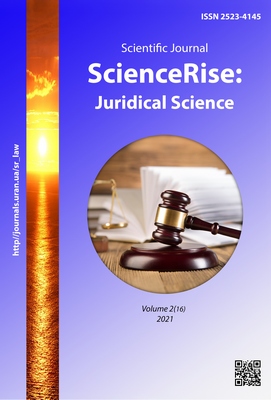Legal regulation of the universal European election process
DOI:
https://doi.org/10.15587/2523-4153.2021.234520Keywords:
electoral process, European Parliament, European integration, suffrage of Ukraine, restrictions on suffrage, protection of personal dataAbstract
The study is devoted to the analysis of the main normative legal acts, regulating the holding of elections within the European Union, linked to the evolution of Ukrainian Constitutionalism and the integration of Ukrainian law into the European legal space. It has been proved, that the correct choice of an electoral system creates a suitable environment for the citizens to exercise one of the fundamental democratic rights, namely to elect their authorized representative who in their turn represent their interests.
The article states that despite the growing role of the European Parliament, the election procedure has been only partially coordinated due to the lack of the universal election procedure for all EU members. At present some fundamental principles, regulating this procedure, are stipulated by the 1976 Election Law, however a lot of aspects are regulated by the national legal systems. The lack of universal election law for all EU members potentially deprives European elections of a real European dimension. The recent years have witnessed several attempts to reform the EU election system. However not all of them have led to the adoption of relative Directives. In particular, there are disputes regarding the transnational constituency. The supporters believe it to be the step in the right direction, while the opponents express fears that it will increase the distance between the public and its elected representatives. The author points out that the outcomes of the spring 2019 European Parliamentary elections have common features with the outcomes of Parliamentary and local elections in Ukraine. Problems, related to the European Parliament elections in 2019 and existing in Ukraine, have been identified, such as restrictions for the exercise of voting rights by persons with disabilities due to various reasons, the use of digital technologies and related cybersecurity issues in the election process, protection of personal data and so on
References
- Stryzhak, A. A. (2012). Vyborche pravo Ukrainy: (istoriia i suchasnist). Kyiv: Lohos, 447.
- Kliuchkovskyi, Yu. B. (2018). Pryntsypy vyborchoho prava: doktrynalne rozuminnia, stan ta perspektyvy zakonodavchoi realizatsii v Ukraini. Kyiv: Vaite, 908.
- Kofman, B. Ya. (2011). Mizhnarodni vyborchi standarty: hnoseolohichni pytannia spryiniattia v natsionalne zakonodavstvo Ukrainy. Naukovyi visnyk Akademii munitsypalnoho upravlinnia. Seriia. Pravo, 2, 268–275.
- Marchenko, M. N., Deryabina, E. M. (2014). Pravovaya sistema Evropeyskogo Soyuza. Moscow: Norma-Infa-M, 704.
- Dovhan, V. M. (2007). Yevropeiskyi Parlament. Pravovyi status i kompetentsiia v systemi orhaniv Yevropeiskoho Soiuzu. Kyiv: KNT, 204.
- Crego, M. D. (2021). Transnational electoral lists. Ways to Europeanise elections to the European Parliament. European Parliamentary Research Service. PE 679.084. Available at: https://www.europarl.europa.eu/RegData/etudes/STUD/2021/679084/EPRS_STU(2021)679084_EN.pdf Last accessed: 17.05.2021
- Dohovir pro zasnuvannia Yevropeiskoi Spilnoty (konsolidovana versiia stanom na 01.01.2005). Available at: https://zakon.rada.gov.ua/laws/show/994_017#Text Last accessed: 17.05.2021
- Khartiya osnovnykh prav Evropeyskogo Soyuza (2000). Evropeyskiy Parlament. No. 2000/C 364/01. 07.12.2000. Available at: https://zakon.rada.gov.ua/laws/show/994_524#Text Last accessed: 17.05.2021
- European Parliament on stocktaking of European elections (2020). Resolution. No. 2020/2088(INI). Available at: https://www.europarl.europa.eu/doceo/document/TA-9-2020-11-26_EN.html#sdocta4 Last accessed: 17.04.2021
- Kodeks nalezhnoi praktyky u vyborchykh pytanniakh (2002). Rezoliutsiia Parlamentskoi Asamblei Rady Yevropy ta Konhresu mistsevykh i rehionalnykh vlad Rady Yevropy. No. 1320. Available at: https://www.venice.coe.int/webforms/documents/default.aspx?pdffile=CDL-AD(2002)023rev2-cor-ukr Last accessed: 17.04.2021
- Żurawski, Р. Unia Europejska po wyborach do Parlamentu Europejskiego. Available at: https://usa-ue.pl/teksty-i-komentarze/teksty/unia-europejska-po-wyborach-do-parlamentu-europejskiego/ Last accessed: 17.05.2021
- Schweitzer, V. (2019). The European Parliament: Time for Changes. Contemporary Europe, 3 (89), 42–52. doi: http://doi.org/10.15211/soveurope320194252
- Konventsiia pro osib z invalidnistiu (2006). Heneralna Asambleia OON. No. 995_g71. 13.12.2006. Available at: https://zakon.rada.gov.ua/laws/show/995_g71#Text Last accessed: 17.04.2021
- Real rights of persons with disabilities to vote in European Parliament elections. Information report (2019). European Economicand Social Committee. Available at: https://www.eesc.europa.eu/en/our-work/publications-other-work/publications/real-rights-persons-disabilities-vote-european-parliament-elections-information-report Last accessed: 17.05.2021
- Maurer, A. D. (2020). Digital technologies in elections - Questions, lessons learned, perspectives. Council of Europe, 62. Available at: https://edoc.coe.int/en/elections/8156-digital-technologies-in-elections-questions-lessons-learned-perspectives.html Last accessed: 17.05.2021
Downloads
Published
How to Cite
Issue
Section
License
Copyright (c) 2021 Sofiia Son

This work is licensed under a Creative Commons Attribution 4.0 International License.
Our journal abides by the Creative Commons CC BY copyright rights and permissions for open access journals.
Authors, who are published in this journal, agree to the following conditions:
1. The authors reserve the right to authorship of the work and pass the first publication right of this work to the journal under the terms of a Creative Commons CC BY, which allows others to freely distribute the published research with the obligatory reference to the authors of the original work and the first publication of the work in this journal.
2. The authors have the right to conclude separate supplement agreements that relate to non-exclusive work distribution in the form in which it has been published by the journal (for example, to upload the work to the online storage of the journal or publish it as part of a monograph), provided that the reference to the first publication of the work in this journal is included.








